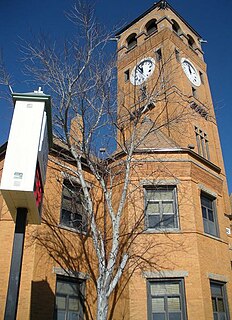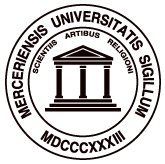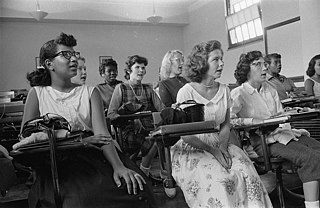Related Research Articles

Tuskegee is a city in Macon County, Alabama, United States. It was founded and laid out in 1833 by General Thomas Simpson Woodward, a Creek War veteran under Andrew Jackson, and made the county seat that year. It was incorporated in 1843. It is the largest city in Macon County. At the 2020 census the population was 9,395, down from 9,865 in 2010 and 11,846 in 2000.

Macon, officially Macon–Bibb County, is a consolidated city-county in the U.S. state of Georgia. Macon lies near the state's geographic center, about 85 miles (137 km) southeast of Atlanta—hence the city's nickname, "The Heart of Georgia".

Charlayne Hunter-Gault is an American civil rights activist, journalist and former foreign correspondent for National Public Radio, CNN, and the Public Broadcasting Service. Charlayne Hunter and Hamilton Holmes were the first African-American students to attend the University of Georgia.

Mercer University is a private research university with its main campus in Macon, Georgia. Founded in 1833 as Mercer Institute and gaining university status in 1837, it is the oldest private university in the state and enrolls more than 9,000 students in 12 colleges and schools: liberal arts and sciences, business, engineering, education, music, college of professional advancement, law, theology, medicine, pharmacy, nursing, and health professions. Mercer is a member of the Georgia Research Alliance and has a chapter of Phi Beta Kappa, the nation's oldest collegiate honors society.

Segregation academies are private schools in the Southern United States that were founded in the mid-20th century by white parents to avoid having their children attend desegregated public schools. They were founded between 1954, when the U.S. Supreme Court ruled that segregated public schools were unconstitutional, and 1976, when the court ruled similarly about private schools.

The Interdenominational Theological Center (ITC) is a consortium of five predominantly African-American denominational Christian seminaries in Atlanta, Georgia, operating together as a professional graduate school of theology. It is the largest free-standing African-American theological school in the United States.

Stratford Academy is a private school in Bibb County, Georgia, United States, near Macon. It opened September 1960.

First Presbyterian Day School (FPD) is a private, college-preparatory Christian day school in Macon, Georgia, United States. FPD was founded in 1970 by Macon's First Presbyterian Church and has been described at the time of its founding as a segregation academy.
Andrew Michael Manis is a historian, author, and professor at Middle Georgia State University in Macon, Georgia.
The Atlanta Student Movement was formed in February 1960 in Atlanta by students of the campuses Atlanta University Center (AUC). It was led by the Committee on the Appeal for Human Rights (COAHR) and was part of the Civil Rights Movement.

School integration in the United States is the process of ending race-based segregation within American public and private schools. Racial segregation in schools existed throughout most of American history and remains an issue in contemporary education. During the Civil Rights Movement school integration became a priority, but since then de facto segregation has again become prevalent.
This is a timeline of the 1947 to 1968 civil rights movement in the United States, a nonviolent mid-20th century freedom movement to gain legal equality and the enforcement of constitutional rights for People of Color. The goals of the movement included securing equal protection under the law, ending legally-established racial discrimination, and gaining equal access to public facilities, education reform, fair housing, and the ability to vote.
The Augusta Riot was a collective rebellion of Black citizens in Augusta, Georgia, and the largest urban uprising in the Deep South during the Civil Rights era. Fueled by long-simmering grievances about racial injustice, it was sparked by White officials’ stonewalling in the face of Black citizens’ demand for answers about the beating death of Black teenager Charles Oatman. At its height on the evening of May 11, 1970, two to three thousand people participated, ransacking and setting fire to White- and Chinese-American-owned businesses, damaging $1 million of property over a 130-block area. White police officers violently suppressed the riot, with the endorsement of Georgia governor Lester Maddox, shoot-to-kill orders from their captain, and reinforcements by the National Guard and State Patrol. Despite the suppression, the riot fundamentally shook the status quo, galvanizing a new wave of activism that opened economic and political doors for Augusta’s Black citizens.
Frances Freeborn Pauley was a southern civil rights activist in Georgia, who battled against racial injustice and discrimination throughout her life. Due to her actions in the civil rights movement, she led to the eventual desegregation and integration of African Americans in the south.

Vivian Wilson Henderson was an American educator and human rights activist, and the eighth president of Clark Atlanta University. Vivian Wilson Henderson became President of Clark College in 1963, at the age of 40, where he would serve as president for 10 consecutive years. This appointment was ultimately a victory for the institution, the Methodist Church, and all committed to the excellence of black academia. Henderson largely believed in the uplift of black schools through investing in them so that they made be able allotted the proper resources in order to showcase the intellect and sheer talent in which they already possessed on a larger scale.
Alice Buck Norwood Spearman Wright was an American liberal feminist advocating for human relations. From 1954 to 1967, she served as the executive director of the South Carolina Council on Human Relations, which was an affiliate of the South Carolina Division of the Southern Regional Council (SRC). She directed the council to participate in the Voter Education Project, which helped to promote compliance with the Civil Rights Act of 1964.
Herchelle Sullivan Challenor is a foreign policy expert, international civil servant, university administrator, and was one of the key activists in the Atlanta Student Movement, part of the Civil Rights Movement, of the early 1960s.
The Atlanta sit-ins were a series of sit-ins that took place in Atlanta, Georgia, United States. Occurring during the sit-in movement of the larger civil rights movement, the sit-ins were organized by the Committee on Appeal for Human Rights, which consisted of students from the Atlanta University Center. The sit-ins were inspired by the Greensboro sit-ins, which had started a month earlier in Greensboro, North Carolina with the goal of desegregating the lunch counters in the city. The Atlanta protests lasted for almost a year before an agreement was made to desegregate the lunch counters in the city.

Wiley Austin Branton (1923-1988) was a prominent civil rights lawyer and activist from Arkansas. Branton rose to prominence after filing the suit against the Little Rock School Board which would eventually be heard before the Supreme Court. After the trial, Branton moved to Atlanta, Georgia, where he acted as the executive director of the Voter Education Project. He then spent time working for the government as the executive director of for the President's Council on Equal Opportunity and as a lawyer for the Department of Justice. He also served as the Dean of Howard University School of Law for five years.
Georgia Baptist College was a private grade school and college in Macon, Georgia, United States. It was founded in 1899 as Central City College and was renamed in 1938. It closed due to financial difficulties in 1956.
References
- 1 2 3 4 5 Nichols, Kimberly E. (2001). "Georgia Council on Human Relations". In Mjagkij, Nina (ed.). Organizing Black America: an encyclopedia of African-American associations. New York: Garland. p. 245. ISBN 978-0-8153-2309-9 . Retrieved 2010-10-25.
- ↑ Manis, Andrew Michael (2004). Macon Black and White: an unutterable separation in the American century. Macon, Georgia, USA: Mercer University Press. p. 193. ISBN 978-0-86554-958-6.
- ↑ Manis, Macon Black and White, p. 155.
- ↑ Patton, Randall L. (2007-10-12). "Southern Regional Council". New Georgia Encyclopedia. Georgia Humanities Council and the University of Georgia Press. Retrieved 2010-10-24.
- ↑ Dillard, Lavada. "Berry College and the Council on Human Relations". Freedom On Film: Civil rights in Georgia. Atlanta: University of Georgia. Retrieved 2010-10-25.